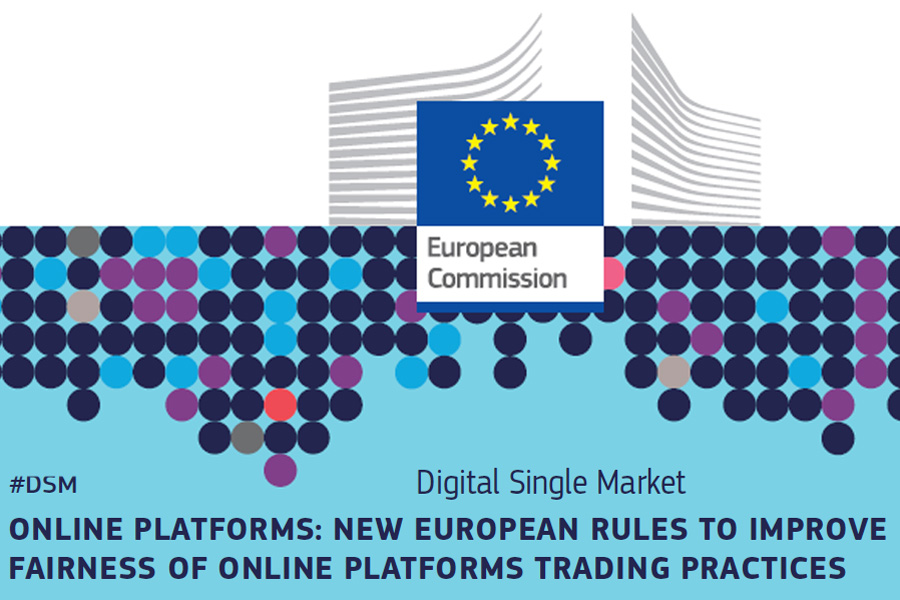The European Parliament, the Council of the European Union and the European Commission have reached a political deal on the first-ever rules aimed at banning unfair marketplace practices. This includes transparency on how search results are ordered, if a marketplace also sells on it’s own platform what advantage they give items they sell themselves, and dispute resolution mediation.
EU wide surveys and assessments revealed that 42% of small and medium companies in the EU use online marketplaces but nearly 50% of European businesses operating on platforms experience problems. Some 38% of problems regarding contractual relations remain unsolved, and 26% are solved but with difficulties; around €1.27-2.35 billion are lost directly in sales as a result.
What will the new unfair marketplace practices do?
The EU claim that small businesses will particularly benefit immediately from:
1) A ban on certain unfair practices
- No more sudden, unexplained account suspensions. With the new rules, digital platforms can no longer suspend or terminate a seller’s account without clear reasons, and possibilities to appeal. The platform will also have to reinstate sellers if a suspension was made in error.
- Plain and intelligible terms and advance notice for changes. Terms and conditions must be easily available and provided in plain and intelligible language. When changing these terms and conditions, at least 15 days prior notice needs to be given to allow companies to adapt their business to these changes. Longer notice periods apply if the changes require complex adaptions.
2) Greater transparency in online platforms
- Transparent ranking. Marketplaces and search engines need to disclose the main parameters they use to rank goods and services on their site, to help sellers understand how to optimise their presence. The rules aim to help sellers without allowing gaming of the ranking system.
- Mandatory disclosure for a range of business practices. Some online platforms not only provide the marketplace, but are also sellers on the same marketplace at the same time. According to the new transparency rules platforms must exhaustively disclose any advantage they may give to their own products over others. They must also disclose what data they collect, and how they use it – and in particular how such data is shared with other business partners they have. Where personal data is concerned, the rules of the GDPR apply.
3) New avenues for dispute resolution.
Today sellers are often left stranded with no ways to appeal or resolve complaints when problems arise. This will change with the new rules.
- All platforms must set up an internal complaint-handling system to assist business users. Only the smallest platforms in terms of head count or turnover will be exempt from this obligation.
- Platforms will have to provide businesses with more options to resolve a potential problem through mediators. This will help resolve more issues out of court, saving businesses time and money.
4) Enforcement
- Business associations will be able to take platforms to court to stop any non-compliance with the rules. This will help overcome fear of retaliation, and lower the cost of court cases for individual businesses, when the new rules are not followed. In addition, Member States can appoint public authorities with enforcement powers, if they wish, and businesses can turn to those authorities.
The new rules will apply 12 months after its adoption and publication, and will be subject to review within 18 months.
Will the rules make any difference?
It is likely that many of the largest marketplaces, who will have been following developments of the new unfair marketplace practices rules as they were developed, will claim that they already abide by the rules. For instance, banning marketplaces from suspending or terminating a seller’s account without clear reasons won’t make much difference when marketplaces already give reasons and ‘clear’ is a term very much open to interpretation.
The only real difference will be the requirement to provide easily accessible external mediators for out-of-court dispute settlement to make it easier for small businesses to appeal against massive marketplaces. Even this will have limited value as once suspended the damage is already done – we all know that if our marketplace listings are suspended that loss of recent sales etc will already have had a punitive and serious impact on future turnover that can’t be recovered, not to mention emails sent to buyers telling them the seller is suspended. All mediation may help with is getting reinstated but it won’t solve losses already incurred.










13 Responses
Remember when they make those changes to your terms and conditions and give you a link to click if you’re not happy?
It takes you to a Close My Account page on Ebay or Paypal.
Says it all, really.
Amazon has to be banned from trading it’s own goods on it’s own marketplace as this is unfair competition. These two businesses should be separated. If they want to sell their own products they should do so on a separate website otherwise what kind of marketplace is this when the owner itself sells more than half of the products, it is more like a store not a marketplace.
How can Amazon sell their own goods, on their own market place, with “will be delivered in 2 – 3 Months” and they still have the “Buy Button”?
I hope this finally prevents eBay from throttling sellers accounts and silently limiting their listings visibility without apparent reason, including those of many long term honest sellers. What they are doing is totally unfair.
I would love to see them stopping this practice of automatically refunding buyers then making you appeal the case. Even if you wiun the buyer still gets to keep the money and ebay pays you! So it is a no lose for the buyer in cases of fraud etc.
Plus the appeals process nearly always states they they can’t act as they haven’t actually seen the item at any stage…. yet are happy to take buyers word over sellers evidence. I believe they call this being an accessory to fraud. But they know that a seller wont risk getting banned if they take any action against ebay….
Another win win for anyone but the seller.
Whilst I agree that marketplaces can seem unfair, surely the same rules apply to all.
Personally I find that Amazon are the worst offenders, as Julie said, how can Amazon have the “Buy Box” yet have no stock? I also noticed other sellers who use FBA also still have listings when they have stock due in.
Marketplaces own and run their business website with their rules, if we don’t like them we are free to build our own and promote our own business in other ways.